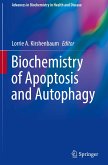Cellular Respiration and Carcinogenesis presents leading experts in the field as it informs the reader about both basic and recent research in the field of cellular respiration and the effects of its dysfunction, alteration or attenuation on the development of cancer. This masterfully compiled text offers the reader a fundamental understanding about how oxygen sensing and/or availability, programmed cell death, immune recognition and response and glucose metabolism are intimately linked with the two major mechanism or pathways of cellular respiration; oxidative phosphorylation and glycolysis. The editors and contributing authors proficiently and unequivocally address the effects of dysfunction of the mitochondrial oxidative phosphorylation/glycolysis (cellular respiration) mechanisms and pathways on the development of cancer. While it remains true that there are no universal truths in cancer, Cellular Respiration and Carcinogenesis opens the dialogue that the etiology of cancer can usually be associated with, and significantly attributed to the failure of one or multiple pathways of oxidative phosphorylation (cellular respiration) to normally burn fuel to generate energy, vis-à-vis the Warburg hypothesis. Keeping with its cutting-edge nature, Cellular Respiration and Carcinogenesis provides the first glimpse to a cautionary evidence based counterbalance to the recent and rapidly proliferating notion that utilization of fuel primarily via glycolysis is a hallmark of cancer development.
From the reviews:
"It includes 12 chapters on topics ranging from the regulation of glucose metabolism in neoplastic cells ... . The book is written for clinical and basic science researchers across a wide range of life science disciplines ... . Students and experts ... will appreciate this thoughtful and stimulating review of the field. ... This book captures the excitement of the field. This is the book to have if you are interested in glucose metabolism, oxygen utilization, ATP, mitochondrial function, apoptosis, and cancer." (Bruce A. Fenderson, Doody's Review Service, May, 2009)
"It includes 12 chapters on topics ranging from the regulation of glucose metabolism in neoplastic cells ... . The book is written for clinical and basic science researchers across a wide range of life science disciplines ... . Students and experts ... will appreciate this thoughtful and stimulating review of the field. ... This book captures the excitement of the field. This is the book to have if you are interested in glucose metabolism, oxygen utilization, ATP, mitochondrial function, apoptosis, and cancer." (Bruce A. Fenderson, Doody's Review Service, May, 2009)








